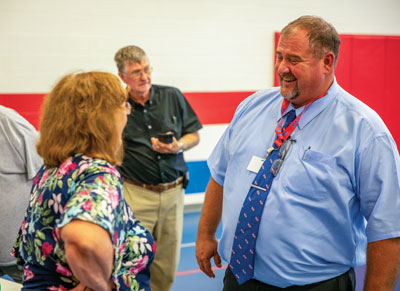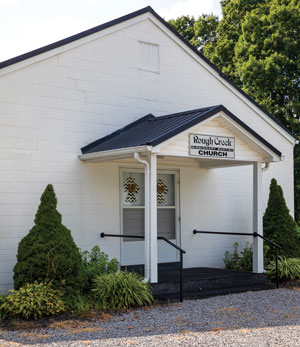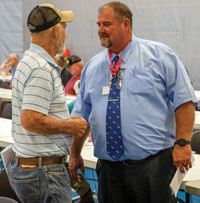SCOTTSVILLE—A story published by Lifeway in 2014 made the statement “as a bivocational pastor, you can be many things but you cannot be lazy.” If there’s anyone who is testimony to the truth of that statement, it’s John Mark Williams.

Brandon Porter
For the past 10 years, he has been pastor of Rough Creek Baptist Church in Allen County, but he also works a family farm of about 120 acres. And to add to his work schedule, he is assistant transportation director for the Allen County School District. For most of the year, his day begins around 3:45 a.m. and ends at dark.
“I thoroughly enjoy being a farmer, I thoroughly enjoy being a pastor, but most of all I enjoy being one of the Father’s children,” Williams said. “My goal is to be a blessing to Him and I want to honor Him and I want to be a vessel of good; something that He can use, something He can use to pour Himself out to other people.”
He said a bivocational pastor will struggle with the challenges of a busy schedule. “You try and fit everything in and thank the Lord for cell phones and being able to stay in contact with people.”
Williams took time from his busy schedule to attend the Mission Board’s July meeting in Louisville for the confirmation vote on Todd Gray as the new executive director-treasurer of the KBC. He reflected on a scripture quoted during that meeting where the apostle Paul said he had “become all things to all men that he might win some.”
“With the many hats I wear, I want to be like Paul,” Williams said. “I have my farming hat I can put on, and I use that opportunity to share. One of my desires is for our family farm—I know it’s an inheritance from the Lord and I want to use that to honor Him and to bless Him — that He receives the glory. And there’s a another big story in that. It has to do with a single cup and my sister still has the cup.”
He went on to explain, “My great-grandfather got really ill when he was a child and they had this one little cup, goblet-like, and they used that cup to nurse him back to health. And if it hadn’t been for that, none of my family would be here today.”
And there’s the hat associated with his work in the school system.
“I have a very large mission field—our school district has approximately 3,000 students. The government and the state may say that I can’t just go in there and talk about Jesus, but I can try to live out Jesus before them every day. And there have been many opportunities that I’ve had to share the gospel at different times.
“I was driving a school bus one time when a young lady was having some issues—she just came up one day and talked to me about it. I said I had had those problems before myself. She asked how did I deal with that. I said, ‘I’m glad you asked.’ When they ask, I am free to tell.”
The pastor-farmer-school worker recalled the time he was preparing for a January mission trip to Jamaica. “This pale skin of mine didn’t need to get sunburned, so I was going to a tanning bed. I had lost my job at factory which had closed, and I was working as an instructional assistant in our school system before I started driving a school bus. One day one of the students asked, ‘Are you going to a tanning bed?'” Williams replied that he was, prompting the student to ask why, providing the opportunity to explain the mission work.
“In a couple of weeks I went on my mission trip and I came back and they wanted to know what we did and how it went. I had the opportunity to share with them some of the things I had shared with those young children and people in Jamaica. So the doors are there to be opened.”

Brandon Porter
Williams said it’s a challenge to find time to get out into the community. He said the logistics make it even more difficult for him to get into the community and talk to people “because I don’t live in the community, it’s across the county from me. But I encourage my congregation do that and they’ve been doing a wonderful job. Since around the first of the year we’ve had three new families start coming to church. Two of those families have now joined the church. One family came—the husband and wife and four kids—and I told them jokingly that they increased our attendance by 25 percent.” The church baptized five people on one day in May. “I think that’s something for a small country church. My church is literally at the end of a dead end road.”
On that baptismal day, the first person to be baptized was the father in that family of six which had recently started attending. After two other people were baptized, the man’s daughter was baptized. She told the pastor that morning that she had prayed the night before to ask Jesus to be her Lord and Savior, and she was ready to be baptized.
“When we baptize, we always provide a little handkerchief for them to hold their nose with. When I baptized her, she laid it up on the side of the baptistry. Somehow it caught my attention and I grabbed it and handed it to one of our deacons, and asked him to give it to her dad. I told that dad, ‘You’ve got three more kids, and I’m planning on using that again.'”
The story of that baptismal service has another twist. That daughter was the fourth person to be baptized that day. Williams then asked if there was anyone else who needed to be baptized, perhaps they had been saved but never been baptized or perhaps they’d never been saved. He told the congregation, “We’ll baptize you — we’ve got water, I’m wet and we’re good to go.”
He was shocked at what he happened next. His wife, Jean Anne, starting her 26th year as a kindergarten teacher, stood up and said she needed to be baptized. She went on to explain that she was saved at a young age and was reared as a General Baptist. Her grandfather was a General Baptist pastor and baptized her. But she said, “I didn’t understand it or appreciate it near as much as I do today.” Williams noted, “So I got to baptize my wife that day, and it was on our anniversary. That was an exciting day for me.”
Godly heritage
Williams’ mother died of cancer 23 years ago this month, but her influence on his life remains to this day. He vividly recalls her final days on earth. “I was in the tobacco patch and my dad called—we didn’t have cell phones, but he knew where I’d be. He said I needed to get to the hospital in Bowling Green. I drove too fast, but Daddy said I needed to get there. When I got there my mom was in so much pain that they were going to sedate her. My mom was a nurse—she taught nursing at Western Kentucky University—she looked at her pain doctor, who was a Jew. She said, ‘Here’s what I want you to do. I cannot deal with this pain any longer. If you’ll figure out some way I will be not in pain you wake me up and we’ll talk about it.’ She said, ‘I know that you don’t believe in my Jesus but we believe in the same God.’ And he looked at her and he said, ‘I know about your Jesus.’ So my mom, on her deathbed, was witnessing to this doctor.
“My mom was hurting really bad, and they wanted me to get there before they sedated her. I got there and I was the last one to talk to her. I went over to her bed, and told her they were coming to give her medicine so she wouldn’t hurt. She looked up at me, and with the last words my mom ever said, told me to ‘lose that belly’ because she knew it would be detrimental to my health. My mom, even dying, was concerned about me.”
Her parental advice is something he has never forgotten
“My momma’s phrase was always, ‘Son, have you prayed about it (when I was having problems)?’ I’d tell her yes sometimes when I hadn’t, just so she’d leave me alone. But that was something that stuck with me. I suffered from panic attacks, anxiety and depression. When I was going through my roughest battles, what kept coming back to me was my parents’ words.
“One day I went to talk to my dad—my mom had passed away. I went and said, ‘Daddy, I don’t know what else to do. Daddy, I have prayed and I’ve prayed and I prayed til I can’t pray any more.’
“My daddy is not a man of many words, but I always learned if my daddy said things like ‘you better quit or you better sit down,’ I better do it because Daddy meant what he said. My dad looked straight at me and said. ‘Maybe God wants you to just shut up and listen for a little while.’ That’s what I needed to hear.”
Williams grew up in the Methodist church, but notes “it’s not about Methodist or Baptist, it’s about the Lord’s work. We don’t have Sunday night or Wednesday night services where I pastor. So our family goes to Scottsville Baptist on Sunday and Wednesday nights. They were having a visitation effort one night, taking some of the youth with them. No one was left but me and my daughter when we got there, so we got some flyers and started. My daughter and I got to go around and witness. People need to know Jesus, and I tell people to be in a Bible-believing, teaching church.”

Brandon Porter
Ministry call; depression battle
When Williams was dating the woman who would become his wife, they attended a General Baptist Church. That’s where he eventually announced his call to preach. “But it took me a while to get there. I tell people that the Lord called me to preach and it wasn’t that I ran from it, I just got so busy that I ignored Him.
“And then I tell people I was in a battle. God wanted me. Satan had my attention. I wasn’t doing bad stuff — I was just busy. I started having problems with panic attacks, anxiety, depression and finally saw a counselor.
“She asked me the first time I saw her, ‘Do you think the Lord is calling you into the ministry?’ I said no. But later on I had to admit that He had.” In the midst of that struggle, the battle against anxiety and depression intensified.
“I went back and forth there for a long time, but I remember one afternoon, on our back deck, I looked at my wife and I told her, ‘I don’t want to scare you. I said I’m not going to do anything, but I know now why people commit suicide. I’m miserable.’ I could not ask for any better woman to be my wife, but there was only so far she could walk with me. And then another Man came in and walked beside me, and His name was Jesus. He put his arm around me and I didn’t have to walk it alone.
“I went to the doctor because I was having panic attacks every day. The doctor said, ‘You’re a big ole boy, looks like you could whip this.’ I said, ‘Doc, I do too, but it’s bigger than me.'”
He saw a biblical counselor and a psychiatrist because of the medications he was taking, but the break-through moment occurred while he was outside his home one day. He had not had his prescription for depression refilled. “The Lord said, ‘You don’t need it anymore.’
And so that day I quit cold turkey off that medication. Now you just don’t do that. But God said I didn’t need it any more so I did it. And to this day I’ve never had it.”
Later, he returned for a visit with the biblical counselor. “I’d been having a pretty good couple of months. When I stepped across the threshold door of that office, depression fell on me like a ton of bricks. I could do nothing but cry. If you have never had it you don’t know what it’s like. I could not do anything but just sit there and cry. I was under the weight of it until it was my time to see her. As I began to talk with her, all of a sudden it was like being in a warm room and the air conditioner kicked on and there was a cool rush of air. Then I realized I didn’t feel the same way. I looked at her and I said, ‘Do you know what just happened.’ She said she did. She said, ‘I saw it leave your face.’
“I said, ‘The Holy Spirit just walked through here.’ She said, ‘Yes He did.’
To this day, it (anxiety, depression) no longer controls my life. I won’t say it doesn’t try to raise its head, but it no longer controls my life.”
Chip Hutcheson